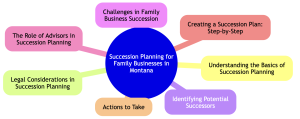
The Role of the Executors in Probate
May 31, 2024
Annual Reporting for Guardians: Montana Elder Law
June 2, 2024Introduction: Family Business Succession Planning
Family business succession planning is an important matter. When the time comes to hand the reins over, it is in the business owner’s best interest to have a well-thought-out plan in place.
There are personal, legal, and financial considerations that can affect the trajectory of the business. What are the values that define your business? What goals do you have for growth?
When deciding who will succeed as the new business owner, it is critical to consider these things so you choose correctly. The obvious choice may not always the best.
This is where an experienced and trusted attorney can help. Montana Elder Law can provide business owners in Montana with sound legal guidance in the succession of their family business.
Key Takeaways
- Future-proofing the Business: Succession planning helps secure a business’s longevity.
- Reducing Conflict: Clearly defined succession paths can minimize family disputes.
- Tax Efficiency: Proper planning can optimize financial outcomes for all parties.
- Leadership Development: Identifies and prepares future leaders early.
- Legal Advisors: Make sure all succession steps are legally sound and beneficial.

Understanding the Basics: Family Business Succession Planning
Succession planning involves a series of strategic steps facilitating the seamless transition of business leadership and ownership.
This process is critical for the continuity of the business, its value, and the welfare of the family.
Types of Succession Plans
- Sale: Selling the business to an external party.
- Merger: Combining the business with another to strengthen market position.
- Transfer: Handing over the business to family members or current employees.
These strategies each have unique implications, affecting everything from daily operations to long-term financial planning for family businesses in Montana.
Legal Considerations in Family Business Succession Planning
In Montana, it is wise to integrate your business succession plan with your estate planning. By doing, so you can reduce the chances of hiccups and make the transition smoother.
This integration helps simultaneously address business continuity and personal estate issues, reducing potential conflicts and legal challenges.
Additionally, consider the tax implications. Effective succession planning can leverage tax strategies that minimize the financial burden on the successor, so the business remains viable and financially healthy after the transition. (1)
Identifying Potential Successors
Once you have determined your values and goals for the business, it is time to Identify and groom potential successors.
By selecting a worthy successor, you leave your business with a leader who understands its operations and shares the founding family’s values.
It’s about securing the future of the business with the right leadership.
Criteria for Selecting the Right Successors
- Skills and Competence: Mastery of the business operations and industry knowledge.
- Experience: Practical exposure to management roles within the business.
- Leadership Qualities: Ability to inspire, direct, and sustain team efforts.
- Vision Alignment: Shares the business’s long-term goals and values.
- Adaptability: Can handle the changing dynamics of the business environment.
Challenges in Family Business Succession
Succession planning in family businesses often brings unique challenges.
Emotional attachments and personal relationships can complicate decision-making processes, potentially leading to conflicts. Clear communication and well-defined roles can mitigate these issues.
Moreover, managing the distribution of responsibilities among family members requires a careful balance to maintain both business efficiency and family harmony.
Effective strategic planning and conflict resolution mechanisms alleviate this. They help smooth the transition so the business adapts to new leadership without losing its core values and operational integrity. By addressing these challenges head-on, family businesses can enhance their prospects for sustainability and success.
The Role of Advisors in Family Business Succession Planning
Legal Advisors
Legal experts can play a big role in succession planning. Their experience with business and estate laws extends to all legal aspects of the succession plan, clearly defining and complying with legal standards.
Financial Advisors
Financial advisors are key to effective succession planning. They offer guidance on tax planning and financial structuring, helping maintain the business’s financial health throughout the transition.
Business Consultants
Business consultants ensure the strategic goals of the business align with the family’s vision and values. Their expertise supports the business strategy for long-term success.
Creating a Succession Plan: Step-by-Step
Developing a succession plan involves several critical steps. Start by assessing the business’s current valuation, then draft a detailed plan document outlining the transition’s structure and timeline. Regular updates and reviews are essential to adapt to any changes in the business or the family’s objectives.
Actions to Take: Family Business Succession Planning
Here are key actionable steps for effective succession planning:
- Conduct a Business Valuation: Understand the current value of your business.
- Identify and Train Successors: Choose and prepare potential successors early.
- Legal and Financial Consultation: Engage with legal and financial advisors to tailor the succession plan to your business’s specific needs.
- Develop a Written Plan: Clearly outline each step of the succession process in a formal document.
- Communicate with Stakeholders: Keep all parties informed to ensure transparency and alignment.
Wrapping Up – Family Business Succession Planning from Montana Elder Law
Succession planning should be an integral part of estate planning for any family business owner in Montana.
This process prepares the business for a smooth transition to future generations and secures the legal and financial foundations during and after the transfer. Effective succession planning incorporates strategic, financial, and legal considerations to protect both the business and family interests.
Montana Elder Law offers expert, comprehensive estate planning services to the family business owners of Montana
Our experienced estate planning attorneys tailor solutions that meet the specific needs of business owners. With our expertise, Montana business owners can benefit from a holistic approach to estate and succession planning, guaranteeing their legacy and the business’s prosperity are well-protected and positioned for future success.
Visit us online at MTELDERLAW.COM
Reference:
(1) Hardvard Business Review, How to Plan A Smooth Succession, https://hbr.org/2022/09/plan-a-smooth-succession-for-your-family-business

